HBO’s upcoming documentary Marathon: The Patriot’s Day Bombing made its world premiere at this year’s Hamptons International Film Festival (HIFF). Directed by Ricki Stern and Annie Sundberg and produced in association with the Boston Globe, the film recounts the tragic April 2013 terrorist attack at the Boston Marathon through surveillance footage and news clips, and also takes an intimate look at the lives of three families who were forever changed because of the bombing, including newlyweds Patrick Downes and Jessica Kensky, during the three years that followed.
Hamptons.com sat down with Downes, who lost his left leg in the 2013 bombings, and Kensky, who lost both of her legs as a result of the bombings, during HIFF to speak about the new documentary.
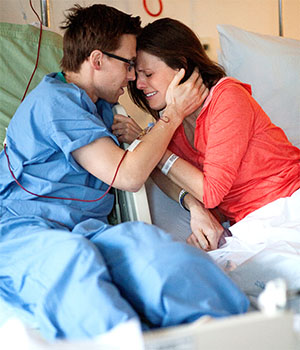 |
|
Patrick Downes and Jessica Kensky. (Photo: Allana Taranto /
|
When you were approached to be a part of Marathon: The Patriot’s Day Bombing, what was your initial reaction?
PD: We were afraid. It’s really hard to capture this kind of nuanced, very deep-rooted story in 1 ½ hours and I think what we eventually had to learn was that this would just be snapshots of our experience and the experience of other families, but hopefully enough to help an audience to understand how deep and complicated and long these recoveries are.
JK: I felt the importance of the story, I felt like someone needed to share it. I just couldn’t believe it was going to be our lives that we were going to be sharing, if that makes sense. I was hoping it would be someone else. But, when I realized that for a lot of reasons – I’m a nurse and Patrick was studying to get his doctorate in psychology – I just think we bring a lot of interesting nuances and topics that people will hopefully discuss. So, it felt important, but I didn’t want it to be our life. As contrary as those two can sound.
Did you think that being a part of the film could be a cathartic process?
PD: Possibly. In watching it back, it is a really important way for us to realize how far we’ve come and all the hard work we’ve put in to get to where we are today – even though we feel we have a long way to go. But, it’s also really sad and heartbreaking at the same time.
JK: I think that doing it was actually way more work than I ever anticipated and it was exhausting, especially when they ended up filming during a period of time when most of it I wasn’t doing well and I was scheduling surgeries and I was deciding whether or not to keep a leg and was really depressed – it was really hard. So, it was not very therapeutic doing it, but now that we have it, it’s like this beautiful artifact of our life and it’s really incredible to be able to sit back and look at all that we’ve been through because it’s easy to forget. I think our minds kind of want to forget those really horrible, painful moments, but if you remember them then you can appreciate how far you’ve come. So it ended up being really therapeutic, but the actual work of doing it – we had no idea what we were signing up for. We had no experience in any of this, so we were very naïve.
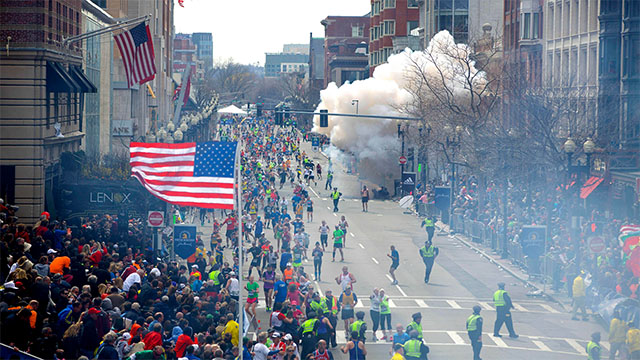 |
|
The Boston Marathon bombings took the lives of three innocent bystanders. (Photos: Tom Green/ZUMA /Courtesy of HBO) |
Walter Reed Army Medical Center seemed to be a turning point in your recovery.
JK: I think being at Walter Reed has impacted our lives just as much, if not more than being part of the Marathon Bombing and it’s the other patients there that we’ve met that have now become close friends, all the amazing clinicians that have refused to stop until they find a solution for me and it’s just a really safe place to be – emotionally and physically. It’s all wheelchair accessible, people don’t stare at me, people don’t ask weird questions – it’s kind of become our refuge. That being said, I don’t want to live there forever and we have been there for over two years. I’m incredibly grateful that we’ve had access to it.
PD: With Congresswoman Tammy Duckworth, she herself was a combat injured army Black Hawk helicopter pilot from Iraq, she lost both legs and is now a Congresswoman from Illinois running for Senate in Illinois, and she has authored legislation to create a national trauma care system. So you can take all the amazing information from military trauma centers and share them with civilian trauma centers and that civilians can share all their experiences with the military. Because we have all these great resources in our country and we want to help them talk even more, so that means that the next time something horrific happens, we can do our best to take care of those people and give them not only their lives back, but some quality of life as well.
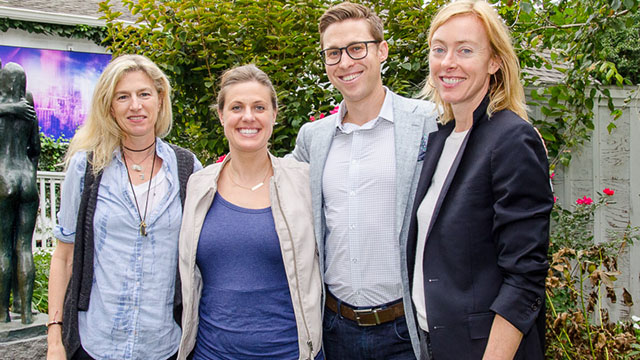 |
|
Ricki Stern, Jessica Kensky, Patrick Downs, and Annie Sundberg at HIFF.(Photo: Lisa Tamburini) |
You guys seem to be very close with the other victims.
PD: They feel like family to us in many ways. We’ve been there to celebrate many of their triumphs and we’ve been there to talk to them through their tragedies and we make fun of each other all the time and our humor is very unique when we’re all hanging out together. It would probably horrify most people, but we take great comfort it in because these are people who we didn’t know before and yet now we feel so closely tied to them.
JK: We do have a name for ourselves now. We’ve officially named ourselves the Boylston Street family because we all could have lived in the Boston area for the rest of our lives and our paths could have never crossed and it’s unfortunate the reason that brought us together, but a lot of beautiful friendships have come out of it. We’re close with most of them and definitely the amputees just because we’re on a unique path together. So you talk about, “Oh, did you try this new foot?” or “Have you been to this doctor?” We share information. And as Patrick said there, we try to celebrate together when happy things happen in our lives and we’re there to comfort when things aren’t going so well. It has become a unique family in that sense. We’re fortunate for that group.
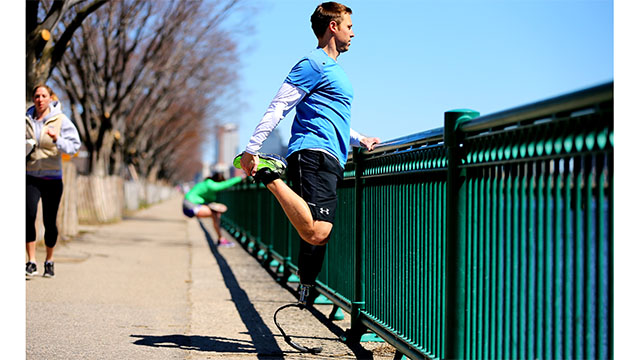 |
|
Patrick Downes prepares to run in the 2016 Boston Marathon. (Photo: John Tlumacki/The Boston Globe / Courtesy of HBO) |
And Rescue, your service dog, also seems to be a very important part of your lives now.
PD: He’s made us laugh so many more times every day. In addition to the many things he can do for Jess’ physical wellbeing – retrieving things and opening doors – he just brings us tremendous joy, and joy to our Boylston Street family and our friends at Walter Reed because he just has this wonderful way about him. He has his own Instagram page, @RescueBoston. So he loves sharing all his adventures and the people he meets and the fun he has, the tricks he can do. So it’s just a really wonderful gift for us.
What did it mean to you – it’s such a shame that something like this has to unify a city – but, it seemed like not only Boston, but the entire United States came together after the bombing?
PD: It was priceless. Without that initial support, without the continued support, our physiological recovery would be much different and I think it’s a powerful message about how we as communities can support each other and really lift each other up and I think there’s something we need to unlock when there isn’t acute trauma to our city. What is it that we can do to have that compassion for each other every day? Not just when the proverbial stuff hits the fan. That’s really important because we are all in this together and in some ways our lives all overlap, so I think we have to establish a better appreciation for that.
JK: Being on the receiving end of so much love and good wishes and gifts and things from not just the city, but the whole country was beautifully overwhelming. That feeling overcame the evil. It just really felt like it was so horrible what happened, it was tragic that anyone was involved, but to feel that – I’ve never felt anything like that in my life. And my husband says it really well when he says that “this was the worst time in our life and also the best.” I think people don’t expect us to say that. We’ve never felt so loved and cared for in our whole lives – in fact in a speech he gave at the one year anniversaries, he said that “he hopes everyone in their lives feels that because it’s incredible.”
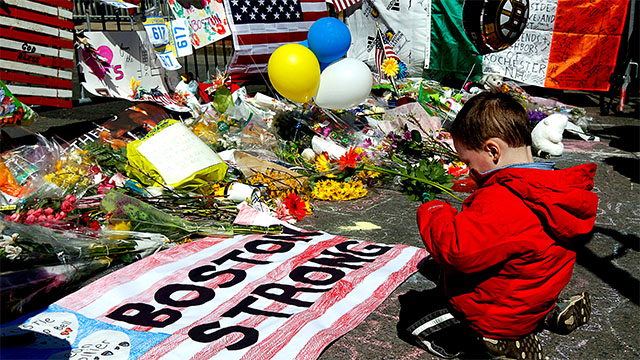 |
|
A Boston Marathon memorial. (Photo: Jim Reuters/Courtesy of HBO) |
Especially since you guys were newlyweds. Not many couples have to go through such a struggle throughout their entire lives.
PD: Seven months in and the vows were real all of the sudden.
JK: When you say in sickness and in health you’re thinking way down the line, you’re not thinking in a few months. You don’t know what life is going to hand you. None of us do.
What do you hope that people take away from the documentary after seeing it?
PD: I think we hope they take away so many different things. We hope that in sharing all these stories, it makes people sit and think and there are so many different themes that could grab somebody. There are many things to take away from the film and most of all society still deals with this type of terrorism, these attacks, and we don’t know how to prevent it yet, but I think Boston has the recipe for how to care for people after the fact. We can all learn from each other about how to do that to make sure that people still have lives worth living and with great purpose.
JK: That’s a really hard question of what I hope people will take away. I think in the beginning I just wanted people to understand how difficult and how long our recoveries were and how much their support meant to us. As the project moved on, I started to see so many other tragedies happening – it feels like it was one right after the other, and we feel like such a small part of that. So now I feel like this movie just represents what’s going on. And then the other thing is that I think there are so many parallels that people can draw to their own lives. So I hope that it gives people hope or strength to get through whatever life has dealt them. I don’t think you have to be blown up by a bomb to have struggles. So I think you can leave with all sorts of messages. But I really hope people leave really thinking and that that thinking turns into some kind of action.
Marathon: The Patriot’s Day Bombing will premiere on HBO on Monday, November 21st at 8 p.m.
For more information, visit www.hbo.com.












